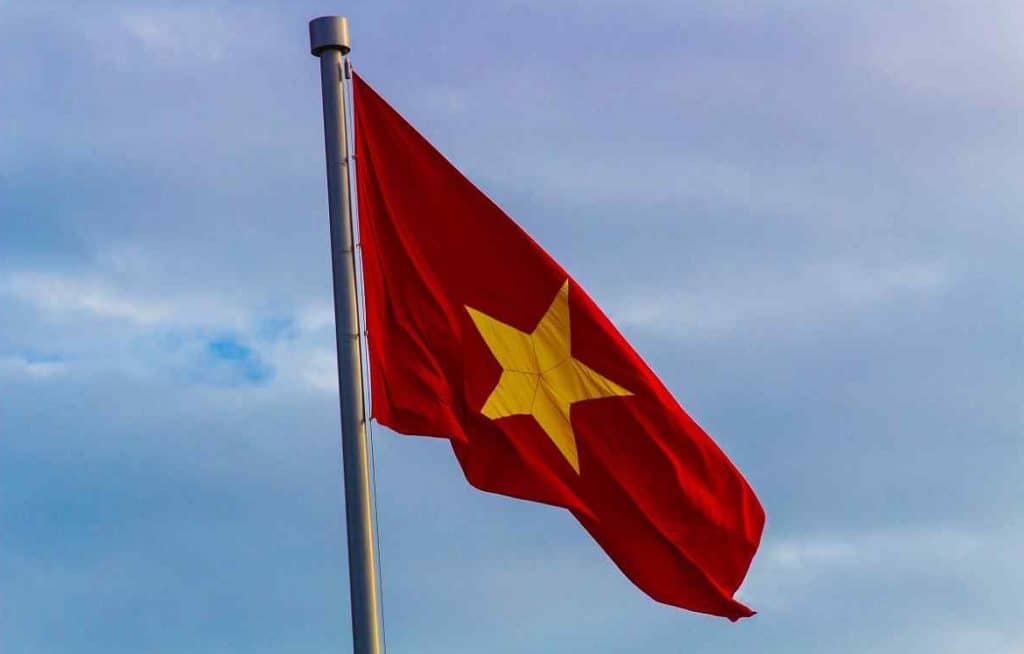World Geostrategic Insights Interview with Carlyle A. Thayer on Vietnam’s reaction to the Ukrainian conflict and effects on its relationship with Russia, the likelihood of a Sino-Vietnamese military confrontation, and the strengthening of Vietnam’s strategic partnerships with a number of countries, including the United States.

Carlyle A. Thayer is professor emeritus at the University of New South Wales, He is a Southeast Asia specialist and the director of the Thayer Consultancy, Canberra. He has taught at the Australian Defense Force Academy, the Asia-Pacific Center for Security Studies, the Australian Command and Staff College, the Center for Defense and Strategic Studies and the Australian Defense College. He was a founding member of the Vietnam Studies Association of Australia, serving as its national secretary. He is the author of more than 500 publications.
Q1. Moscow is Hanoi’s traditional ally and its main arms supplier, while Vietnam is the only ASEAN country with a free trade agreement with Moscow. The Russian and Vietnamese foreign ministers had a meeting, July 6, during which Vietnamese Foreign Minister Bui Thanh Son said that “Russia will always be our most important partner and the main priority in Vietnam’s policy.” But several analysts believe that the Russian invasion of Ukraine has put Vietnam in an uncomfortable political and diplomatic position. Moreover, although Vietnam has struck a careful balance in its reaction to the Ukrainian conflict, it may not be possible to avoid taking sides for a long time. What is your opinion?
ANSWER: Difficulties in Vietnam’s relations with Russia first arose in the aftermath of Russia’s annexation of Crimea in 2014 and the subsequent adoption of the Countering-America’s Adversaries Though Sanctions Act (CAATSA) by the U.S. Congress in 2017.
It is notable that VIETNAM’S defense procurements from Russia fell steadily from US $1.056 billion in 2014 to US $735 million (m) in 2015, US $702 m in 2016, US $465 m in 2017, US $332 in 2018, US $197 m in 2019, and US $23 million in 2020, before rising slightly to US 30 m in 2021. The only ‘big ticket’ arms procurements since 2014 were Vietnam’s orders for sixty-four T-90S main battle tanks in 2017 and twelve Yak-130 jet trainers in 2019.
For a variety of reasons, including the threat implied by CAATSA, Vietnam has lowered the risk of being sanctioned by the United States because of its arms procurements from Russia. In sum, Vietnam is unlikely to be isolated and forced to take sides if it continues to maintain a low profile and refrains from major purchases of Russian military weapons.
Q2. Because of the Ukrainian crisis, could being too close to Moscow disadvantage Hanoi?
ANSWER: Vietnam and Russia are comprehensive strategic partners. Vietnam is heavily dependent on Russia for weapons and military equipment and technology. Vietnam’s current self-imposed restraint on Russian arms procurements could bite over time because Vietnam will need spares, assistance in maintenance, and more modern weaponry.
As two-way trade with Russia is around one percent of Vietnam’s total two-way trade, Vietnam will not be impacted significantly by western economic sanctions.
Vietnam and Russia are joint partners in VietSovPetro, a hydrocarbon exploration and development joint venture that operates globally. Vietnam, like other countries, is experiencing rising energy prices and Russia would be the obvious source of discounted energy. Vietnam can easily evade SWIFT restrictions by conducting barter trade with Russia and making payments in rouble denominated bank accounts.
Vietnam participated in three UN General Assembly votes relating to Vladimir Putin’s war in Ukraine. Among ASEAN’s ten members, Vietnam (and Laos) abstained on voting to condemn Russia’s aggression while the other eight members voted for the resolution. On the second vote, regarding the humanitarian consequences of Russia’s intervention, Vietnam (as well as Brunei and Laos) voted to abstain while the other seven ASEAN members voted for the resolution.
The third resolution before the UN General Assembly – to suspend Russia’s membership on the UN Human Rights Council – was more controversial. Two ASEAN members voted for the resolution, six ASEAN members abstained and two, including Vietnam and Laos, voted against. Vietnam has not suffered any noticeable repercussions.
Since the UN General Assembly voted, Vietnam has moved to the middle ground in calling for an end to violence and for dealing with the humanitarian crisis in the Ukraine.
Vietnam’s policy stance converges with that of India which provides some “diplomatic cover” for Hanoi. Vietnam’s top leaders received Russia’s Foreign Minister Sergei Lavrov who dropped by enroute to the G20 ministerial meeting in Indonesia without attracting international criticism. Indonesia hosted Lavrov at a G20 ministerial meeting and is working to ensure there will be no western boycott if Russia participates in the G20 summit at the end of the year. ASEAN Chair Cambodia has already invited Lavrov to attend the end of year ASEAN Ministerial Meeting.
China and Iran, not Vietnam, are the main countries abetting Russia. Russia has just resumed gas supplies to Europe. It is difficult to see why Vietnam would be singled out and put under such pressure that it would feel compelled to take sides.
Q3. Do you think it will be necessary for Vietnam to reassess its relations with Russia?
ANSWER: Vietnam pursues a policy of “diversifying and multilateralizing” in its external relations. Vietnam conducts external relations through a web of seventeen strategic and twelve comprehensive partnerships as well as fifteen free trade agreements. Russia was Vietnam’s first strategic partnership. Russian weapons sales enable Vietnam to maintain its capacity for self-defense. Also, Russia is a permanent member of the UN Security Council and a nuclear power. It is not in Vietnam’s interest to see Russia weakened or to become dependent on China.
For the moment, Vietnam can play a waiting game to see how the war in Ukraine plays out. Vietnam will have to reassess its relations with Russia in the event of three contingencies: (1) Russia is made a pariah state and isolated internationally, (2) Russia becomes so economically weakened it can no longer provide Vietnam the support and assistance it did prior to its invasion of the Ukraine, and (3) Russia becomes strategically dependent China.
Q4. Vietnam is engaged in heated territorial disputes in the South China Sea, and sometimes deadly maritime skirmishes have occurred between the two Asian countries. Derek Grossman, RAND senior defense analyst, said the likelihood of China going to war with Vietnam is greater than with Taiwan. China enjoys broad military advantages over Vietnam, while the shared land frontier presents no particular topographical challenges, so there is considerable risk that an incident in the South China Sea could result in a military confrontation on the land border between Vietnam and China, a scenario Grossman said is more likely than a Chinese invasion of Taiwan. What is his opinion? Could Beijing really consider a land-based military attack against Vietnam?
ANSWER: China has made it clear, through its anti-secession law, what circumstances would provoke an armed response against Taiwan – declaration of Taiwan’s independence, Taiwan acquiring nuclear weapons etc. China has not been so explicit about what would provoke an armed response against Vietnam. It is clear, however, that China will oppose foreign companies working with Vietnam in waters claimed by China. But China will employ its coast guard and maritime militia rather than naval forces.
China has shown itself to be a prudent and cautious actor in asserting its sovereignty over the South China Sea at least with respect to its military forces, the People’s Liberation Army Navy and People’s Liberation Army Air Force. On the face of it, Grossman’s speculation seems misplaced. China enjoys greater asymmetric advantages in the maritime domain in the South China Sea to respond to any unplanned incident that occurs. The features that Vietnam occupies, including its service support structures, are highly vulnerable.
While China has vastly more powerful land forces than Vietnam in the abstract, deploying these forces across the land frontier with Vietnam would decrease China’s advantage both in terms of mountainous topography and firepower. The war in Ukraine demonstrates that the Russian army is not invincible. Vietnam would inflict serious damage on the Chinese and the international community would rally to support Vietnam. In brief, the game of a Chinese cross border attack is not worth the candle.
Q5. Vietnam does not have a security alliance with any major power or alliance network. According to its “four no’s” principle in foreign and security policy, Vietnam has always maintained that it does not join any military alliance, does not side with one country against another, does not give other countries permission to set up military bases or use its territory to carry out military activities against other countries, and does not use force or threaten to use force in international relations. But now the war in Ukraine has shaken Vietnam’s basic assumption about Russia as a reliable arms supplier. Indeed, because of the war in Ukraine and sanctions, Russia may no longer be able to provide key weapons systems adequate to deter Chinese aggression. Could it be therefore possible a change in Vietnam’s policy of not joining a superpower to appease Beijing? Could Vietnam take into greater consideration the U.S. desire to enlist Vietnam as a strategic partner in the Indo-Pacific?
ANSWER: In Vietnam’s 2019 Defense White Paper the four no’s was followed by a caveat: “Depending on circumstances and specific conditions, Viet Nam will consider developing necessary, appropriate defense and military relations with other countries…” If for some reason Russia ceased to be a reliable supplier of arms to Vietnam this would be a major disruptive factor in Vietnam’s policy of multilateralization. Vietnam would have to rethink its plans to modernize its arms forces to deter a would-be aggressor.
Vietnam-Russian relations are based on a comprehensive strategic partnership agreement, not a formal alliance. No single country, however, would be able to replace Russia as an arms supplier in the short term. Vietnam would not need to become a formal ally to acquire weapons from non-Russian sources. The largest non-Russian suppliers of weapons to Vietnam since 2014 are Israel, Ukraine, Belarus, South Korea and the United States.
Vietnam is highly likely to retain its four no’s defense policy and at the same time seek to upgrade/enhance its strategic partnerships with a variety of countries. India would be the first port of call. Vietnam would also explore other options including Israel and France. In such circumstances the Vietnam-United States comprehensive partnership could be upgraded to a strategic partnership in order to acquire weapons systems vital for national defense. As part of post-Russia reorientation Vietnam would do its best to seal deals involving technology transfer, co-production and assistance in enhancing the capacity of its national defense industry.
Carlyle A. Thayer – Professor emeritus at the University of New South Wales, Southeast Asia specialist and director of the Thayer Consultancy, Canberra, Australia.







